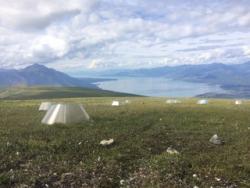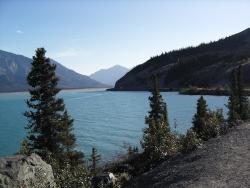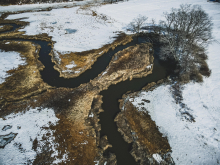Update
This expedition has been postponed until 2022.
What Are They Doing?
 Warming chambers in alpine tundra near Kluane Lake, Yukon, Canada. Photo by Jennie McLaren.
Warming chambers in alpine tundra near Kluane Lake, Yukon, Canada. Photo by Jennie McLaren.
The impacts of global climate warming will be disproportionately felt in arctic and montane ecosystems. There is high risk of these ecosystems releasing their large soil carbon (C) stores with climate warming, positively feeding back to rising atmospheric C. One of the fundamental challenges facing global change research is predicting changes in species distributions and ecosystem functions in response to warming. I propose an experiment which enables the simultaneous study of the direct and indirect effects of warming on ecosystem functioning in northern alpine ecosystems. This type of research has been repeatedly called for to determine how changes in species composition and climate warming will influence biodiversity and ecosystem dynamics.
Few warming experiments occur in alpine, as opposed to arctic tundra, despite the importance of alpine tundra as a C sink, as well as the global distribution of these ecosystems. We will provide a dataset to the tundra warming literature with ecosystem characteristics unique to montane environments, including responses by both the plant and microbial communities, as well as changes in ecosystem C dynamics.
This project will also contribute to a globally-distributed montane ecosystem warming research program. Collaborative networks such as these are essential for examining the context dependent nature of responses to environmental change and will improve our ability to predict responses across ecosystems to climate change.
Where Are They?
 Kluane Lake in Yukon, Canada. Photo by Zeb Polly.
Kluane Lake in Yukon, Canada. Photo by Zeb Polly.
The team will travel to the field station by road which is about 2.5 hours from Whitehorse, in the Yukon Territory of Canada on the Alaska Highway. The team will be staying at a local research station near the field site. They will hike on a challenging but well-maintained trail to the research sites.
Latest Journals

Dr. McLaren is a faculty member in the Department of Biological Sciences at the University of Texas in El Paso. Her research group focuses on the changes in plant community composition that result from environmental change (such as warming or nitrogen deposition), changing herbivore populations, shifts in species ranges and changing land management populations. We examine both how plant communities may change, but also what the effect of that change will be on the functioning of ecosystems, such as their ability to cycle nutrients, decompose plant litter and store carbon. We conduct our research in northern ecosystems, including alpine tundra and boreal forest in Northern Canada (Kluane Lake Research Area, Yukon Territory) and arctic tundra in Alaska (Utqiagvik and Toolik Research Station in Alaska), and also in the deserts of the Southwestern USA. You can read more about our research themes and team at www.jenniemclaren.com.


